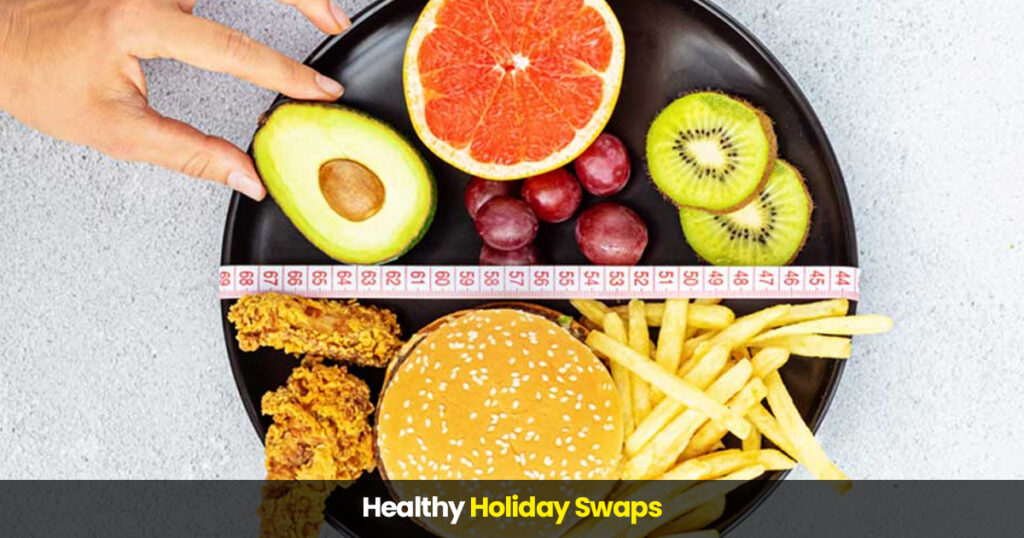While the holidays are a time for cheer and celebration, they can also lead to unwanted weight gain. Keep calm, though! With some preparation and attentive eating, you can enjoy the holidays without jeopardizing your weight-loss progress. Here are some tips to assist you be on track.
1. Planning Ahead for Long-Term Weight Loss Maintenance

Maintaining weight loss can be challenging, especially during holiday seasons or stressful times. However, with careful planning and a proactive approach, you can successfully keep the weight off.
1. Meal Planning
- Healthy Holiday dinners: Create nutritious holiday dinners with lean proteins, whole grains, and plenty of vegetables.
- Portion Control: Use smaller dishes and bowls to limit portion amounts.
- Healthy Snacking: To avoid unhealthy temptations, pack nutritious snacks such as fruits, almonds, or yogurt.
2. Social Support
- Connect with Like-Minded People: Join support groups or online forums to share your experiences and tips.
- Involve Loved Ones: Enlist the help of family and friends to promote healthy practices.
3. Accountability and Tracking
- Food journaling: Keep track of your eating habits to find patterns and opportunities for improvement.
- Weigh-ins: Keep track of your weight on a regular basis, but avoid obsessing over it.
- Set realistic goals. Break down your weight loss goals into small, manageable actions.
Remember that maintaining weight loss is a process, not a destination. Long-term success is possible if you plan ahead, make healthy choices, and stay devoted to your goals.
2. Mindful Eating: A Powerful Tool for Weight Loss Maintenance

Mindful eating is a discipline that focuses on the process of eating rather than just consuming food. By focusing on your senses, emotions, and bodily experiences, you can improve your connection with food and stick to your weight loss goals.
1. Eat Slowly
- Chew your food thoroughly.
- Take small bites.
- Pause between bites.
2. Eat Without Distractions
- Avoid eating ahead of the TV or computer.
- Focus on the taste, texture, and smell of your food.
3. Listen to Your Body’s Hunger and Fullness Cues
- Eat when you’re hungry.
- Stop eating when you’re satisfied, not stuffed.
4. Choose Mindful Eating Environments
Create a peaceful and relaxing dining atmosphere.
Use pleasant-looking dishes and utensils.
5. Practice Gratitude
- Appreciate the food you’re eating.
- Be thankful for the nourishment it provides.
Benefits of Mindful Eating for Weight Loss Maintenance
- Improved Digestion: Eating slowly and chewing thoroughly aids digestion.
- Enhanced Satiety: Mindful eating can lead to increased feelings of fullness, reducing the likelihood of overeating.
- Reduced Emotional Eating: By paying attention to your emotions, you can avoid emotional eating triggers.
- Healthier Food Choices: Mindful eating encourages you to make conscious choices about the foods you consume.
- Weight Management: By eating mindfully, you’ll be able to maintain a healthy weight and forestall weight regain.
By combining mindful eating techniques into your daily routine, you can establish a long-term strategy to weight loss maintenance. Remember that the goal is development rather than perfection.
3. Healthy Holiday Swaps: Enjoy the Festivities Guilt-Free

The holiday season is a time to indulge, but it does not have to derail your weight loss efforts. With a few simple substitutions, you may enjoy the seasonal flavors without feeling guilty.
1. Appetizers
- Instead of: Chips and dip.
- Try: Vegetable sticks with hummus or guacamole.
2. Main Course
- Instead of: mashed potatoes and gravy.
- Try roasted root veggies with herbs and spices.
- Instead of: stuffing with butter and breadcrumbs.
- Try a lighter filling made with nutritious grains and vegetables.
3. Side Dishes
- Instead of: candied sweet potatoes.
- Try roasted sweet potatoes with cinnamon and nutmeg.
- Instead of: creamy mashed potatoes.
- Try mashed cauliflower with herbs and spices.
4. Desserts
- Instead of: Rich, buttery desserts
- Try: Fruit-based desserts like fruit tarts or sorbet
- Instead of: Sugary drinks
- Try: Water, unsweetened tea, or sparkling water
Additional Tips
- Portion Control: Use smaller dishes and bowls to limit portion amounts.
- Mindful Eating: Pay attention to hunger and fullness signs.
- Stay Active: Build physical activity into your holiday schedule.
- Limit your alcohol consumption: Alcohol can lead to weight gain and unhealthy eating habits.
Making these simple modifications allows you to enjoy the Christmas season without jeopardizing your health or weight loss goals. Remember that it’s all about balance and moderation.
4. Stay Active

Staying active is critical for healthy and long-term weight loss. Here’s why.
- Burns Calories: Physical activity helps you burn calories, resulting in a calorie deficit required for weight loss.
- Muscles burn more calories at rest than fat. Strength training increases muscular mass, which raises your metabolism.
- Regular exercise can temporarily boost your metabolism, allowing you to burn more calories even when inactive.
- Exercise produces endorphins, which have mood-enhancing properties. This can aid in relieving stress and preventing emotional eating.
- Weight Loss Maintenance: Regular physical activity is essential for long-term weight loss.
Tips for Staying Active
- Find Activities You Enjoy: Select activities that you find enjoyable and engaging. This will make it easier to maintain a consistent fitness schedule.
- Incorporate Exercise into Your Daily Routine. Use the stairs instead of the lift, park further away from the entrance and go for a walk during your lunch break.
- Set realistic goals. Begin with simple, attainable goals, then progressively increase the intensity and duration of your workouts.
- Find a workout buddy: Having a workout buddy can keep you motivated and accountable.
- Make it Social: Join a sports team, take a dance class, or go on a stroll with friends.
- Listen to Your Body: Rest once you have to and do not push yourself too hard, especially initially.
Types of Physical Activity
1. Aerobic Activity
- Brisk walking
- Running
- Swimming
- Cycling
- Dancing
2. Strength Training
- Lifting weights
- Bodyweight exercises (push-ups, squats, lunges)
- Yoga
- Pilates
Remember that consistency is crucial. Strive for a minimum of 150 minutes of moderate-intensity aerobic activity or 75 minutes of vigorous-intensity aerobic activity every week.
Managing Stress for Weight Loss Maintenance

Stress has a big impact on weight loss efforts. When people are worried, they often reach for high-calorie, high-fat comfort foods. This might lead to weight gain and slow growth.
Here are some successful stress-management and weight-loss strategies:
1. Practice Relaxation Techniques
Meditation: Spend a few minutes per day meditating to relax your thoughts.
Take calm, deep breaths to relieve anxiety and stress.
Yoga: Incorporate yoga into your daily routine to improve flexibility, reduce stress, and enhance general well-being.
2. Prioritize Sleep
Create a Sleep Schedule: Go to bed and get up at the same time every day.
Establish a relaxing bedtime routine: Relax before bed with a warm bath or a book.
Optimize Your Sleep Environment: Make sure your bedroom is dark, quiet, and cool.
3. Engage in Physical Activity
- Regular exercise can assist to reduce stress and enhance mood.
- Find enjoyable activities: Select activities that you enjoy, such as dancing, hiking, or swimming.
4. Connect with Others
- Socialize: Spend time with family and friends.
- Join a support group. Connect with those that have similar goals.
- Seek Professional Help: If stress becomes too much, seek therapy or counselling.
5. Healthy Eating
- Nutrient-dense foods: Eat a well-balanced diet rich in fruits, vegetables, lean meats, and whole grains.
- Limit processed foods and sugary drinks, which can lead to weight gain and increased stress.
- Mindful eating involves paying attention to your body’s hunger and fullness cues.
Implementing these tactics will allow you to properly manage stress while also maintaining your weight loss objectives. Remember, it’s crucial to be patient with yourself and enjoy your minor victories.
Conclusion
By following these suggestions, you can enjoy the holidays without jeopardizing your weight loss goals. Remember, it’s all about balance and moderation.

